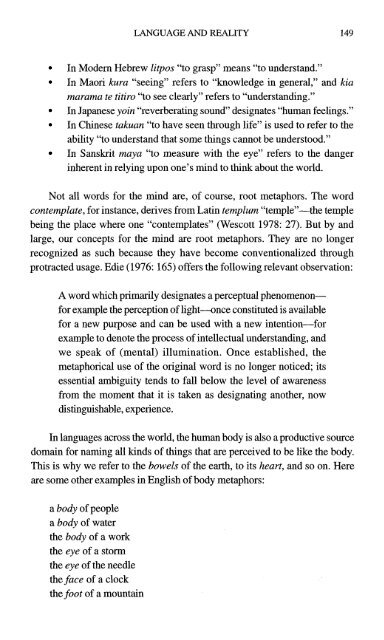A Basic Course in Anthropological Linguistics (Studies in Linguistic ...
A Basic Course in Anthropological Linguistics (Studies in Linguistic ...
A Basic Course in Anthropological Linguistics (Studies in Linguistic ...
You also want an ePaper? Increase the reach of your titles
YUMPU automatically turns print PDFs into web optimized ePapers that Google loves.
LANGUAGE AND REALITY 149<br />
In Modern Hebrew litpos “to grasp” means “to understand.”<br />
In Maori kura “see<strong>in</strong>g” refers to “knowledge <strong>in</strong> general,” and kia<br />
marama te titiro “to see clearly” refers to “understand<strong>in</strong>g.”<br />
In Japanese yo<strong>in</strong> “reverberat<strong>in</strong>g sound” designates “human feel<strong>in</strong>gs.”<br />
In Ch<strong>in</strong>ese takuan “to have seen through life” is used to refer to the<br />
ability “to understand that some thngs cannot be understood.”<br />
In Sanskrit muya “to measure with the eye” refers to the danger<br />
<strong>in</strong>herent <strong>in</strong> rely<strong>in</strong>g upon one’s m<strong>in</strong>d to th<strong>in</strong>k about the world.<br />
Not all words for the m<strong>in</strong>d are, of course, root metaphors. The word<br />
contemplate, for <strong>in</strong>stance, derives from Lat<strong>in</strong> templurn “temple”-the temple<br />
be<strong>in</strong>g the place where one “contemplates” (Wescott 1978: 27). But by and<br />
large, our concepts for the m<strong>in</strong>d are root metaphors. They are no longer<br />
recognized as such because they have become conventionalized through<br />
protracted usage. Edie (1976: 165) offers the follow<strong>in</strong>g relevant observation:<br />
A word which primarily designates a perceptual phenomenon-<br />
for example the perception of light-nce constituted is available<br />
for a new purpose and can be used with a new <strong>in</strong>tention-for<br />
example to denote the process of <strong>in</strong>tellectual understand<strong>in</strong>g, and<br />
we speak of (mental) illum<strong>in</strong>ation. Once established, the<br />
metaphorical use of the orig<strong>in</strong>al word is no longer noticed; its<br />
essential ambiguity tends to fall below the level of awareness<br />
from the moment that it is taken as designat<strong>in</strong>g another, now<br />
dist<strong>in</strong>guishable, experience.<br />
In languages across the world, the human body is also a productive source<br />
doma<strong>in</strong> for nam<strong>in</strong>g all k<strong>in</strong>ds of th<strong>in</strong>gs that are perceived to be like the body.<br />
Ths is why we refer to the bowels of the earth, to its heart, and so on. Here<br />
are some other examples <strong>in</strong> English of body metaphors:<br />
a body of people<br />
a body of water<br />
the body of a work<br />
the eye of a storm<br />
the eye of the needle<br />
theface of a clock<br />
thefoot of a mounta<strong>in</strong>






